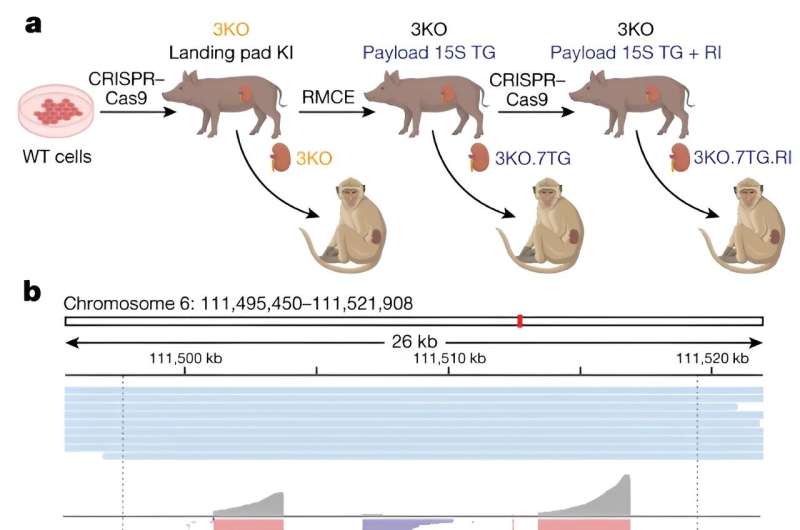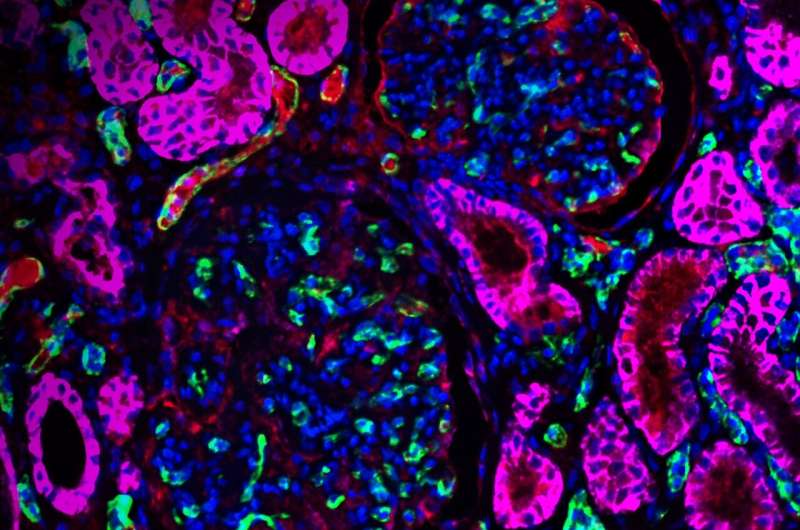October 12, 2023 report
This article has been reviewed according to Science X's editorial process and policies. Editors have highlighted the following attributes while ensuring the content's credibility:
fact-checked
peer-reviewed publication
trusted source
proofread
Monkey survives for two years with genetically engineered pig kidney

A large team of medical researchers affiliated with multiple institutions in the U.S. reports that genetically altering the genome of pigs can reduce the chance of rejection of their organs when transplanted into a primate.
In their study, published in the journal Nature, the group altered the genomes of several miniature pigs and transplanted their kidneys into cynomolgus monkeys to see if they could reduce the chances of rejection. Muhammad Mohiuddin with the University of Maryland School of Medicine, has published a News & Views piece in the same journal issue outlining the work done by the team on this new effort.
One of the primary means for treating people with organ failure is transplantation of an organ from a human donor. Unfortunately, the demand for such organs far outstrips the supply. So scientists have been looking for alternatives, such as growing new organs using stem cells, creating new organs using nonbiological materials, or using animal organs.
The latter option has shown promise but organ rejection, in which the immune system of the recipient attacks the organ, is still an issue. In this new effort, the research team tested a new approach: Altering the genome of the donating animal so that its organs will be less likely to be rejected.

In their work, the researchers edited 69 of the pig's genes. Three were involved in producing rejection-related molecules and 59 were related to retroviral DNA that became embedded in the pig genome many generations ago. The final seven involved adding human genes that are known to promote healthy organ growth, such as by preventing improper blood clotting.
The research team allowed the pigs to grow to maturity, then harvested kidneys from 15 of them, which were placed into cynomolgus macaques—each of the monkeys also received immunosuppressive drugs to prevent rejection. Other monkeys that did not receive edited kidneys lived for less than two months. Of the monkeys that received the kidneys from the genetically altered pigs, nine lived longer than two months; five of those lived for over a year, and one survived for two years. Testing showed that the organs performed just as well as native organs.
The researchers suggest that they are on the right track, but more testing is required. But the team is confident that their approach will one day lead to a method for safely transplanting animal organs into humans.
More information: Ranjith P. Anand et al, Design and testing of a humanized porcine donor for xenotransplantation, Nature (2023). DOI: 10.1038/s41586-023-06594-4
Muhammad M. Mohiuddin, Pig-to-primate organ transplants require genetic modifications of donor, Nature (2023). DOI: 10.1038/d41586-023-02817-w
© 2023 Science X Network




















